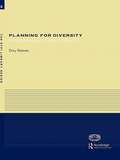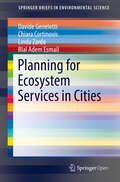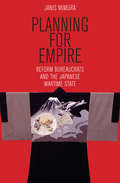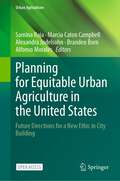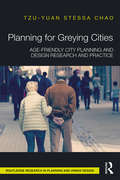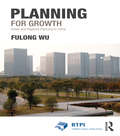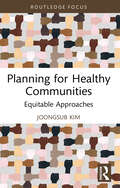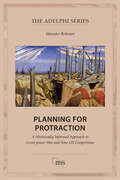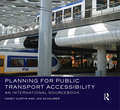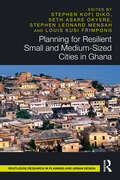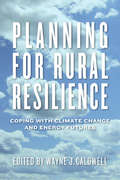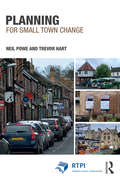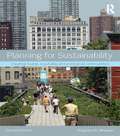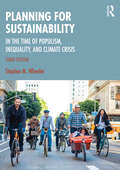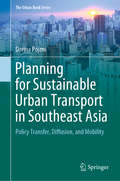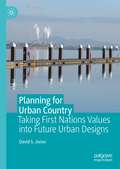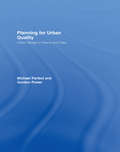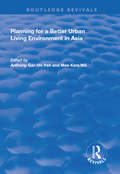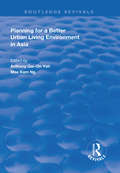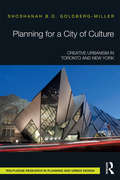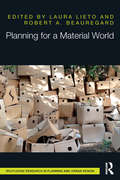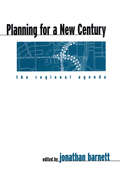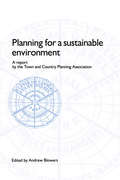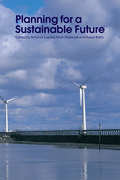- Table View
- List View
Planning for Diversity: Policy and Planning in a World of Difference (RTPI Library Series #Vol. 8)
by Dory ReevesThe practical importance of diversity and equality for spatial planning and sustainable development is still not widely understood. Using international examples, this book shows planners and educationalists the benefits of building in a consideration of diversity and equality at each stage and level of planning.Despite being one of the most diverse and gender balanced of the built environment professions, complacency has been widespread in planning. This book shows why a diverse profession is important and drawing on a wide range of good practice, shows how those involved in planning can develop their sensitivity to and expertise in diversity and equality.
Planning for Ecosystem Services in Cities (SpringerBriefs in Environmental Science)
by Davide Geneletti Chiara Cortinovis Linda Zardo Blal Adem EsmailThis open access book presents current knowledge about ecosystem services (ES) in urban planning, and discusses various urban ES topics such as spatial distribution of urban ecosystems, population distribution, and physical infrastructure properties. The book addresses all these issues by: i) investigating to what extent ecosystem services are currently included in urban plans, and discussing what is still needed to improve planning practice; ii) illustrating how to develop ecosystem services indicators and information that can be used by urban planners to enhance plan design; iii) demonstrating the application of ES assessments to support urban planning processes through case studies; and iv) reflecting on criteria for addressing equity in urban planning through ecosystem service assessments, by exploring issues associated with the supply of, the access to and demand for ES by citizens. Through fully worked out case studies, from policy questions, to baseline analysis and indicators, and from option comparison to proposed solutions, the book offers readers detailed and accessible coverage of outstanding issues and proposed solutions to better integrate ES in city planning. The overall purpose of the book is to provide a compact reference that can be used by researchers as a key resource offering an updated perspective and overview on the field, as well as by practitioners and planners/decision makers as a source of inspiration for their activity. Additionally, the book will be a suitable resource for both undergraduate and post-graduate courses in planning and geography.
Planning for Empire: Reform Bureaucrats and the Japanese Wartime State (Studies of the Weatherhead East Asian Institute, Columbia University)
by Janis MimuraJapan’s invasion of Manchuria in September of 1931 initiated a new phase of brutal occupation and warfare in Asia and the Pacific. It forwarded the project of remaking the Japanese state along technocratic and fascistic lines and creating a self-sufficient Asian bloc centered on Japan and its puppet state of Manchukuo. In Planning for Empire, Janis Mimura traces the origins and evolution of this new order and the ideas and policies of its chief architects, the reform bureaucrats. The reform bureaucrats pursued a radical, authoritarian vision of modern Japan in which public and private spheres were fused, ownership and control of capital were separated, and society was ruled by technocrats.Mimura shifts our attention away from reactionary young officers to state planners—reform bureaucrats, total war officers, new zaibatsu leaders, economists, political scientists, engineers, and labor party leaders. She shows how empire building and war mobilization raised the stature and influence of these middle-class professionals by calling forth new government planning agencies, research bureaus, and think tanks to draft Five Year industrial plans, rationalize industry, mobilize the masses, streamline the bureaucracy, and manage big business. Deftly examining the political battles and compromises of Japanese technocrats in their bid for political power and Asian hegemony, Planning for Empire offers a new perspective on Japanese fascism by revealing its modern roots in the close interaction of technology and right-wing ideology.
Planning for Equitable Urban Agriculture in the United States: Future Directions for a New Ethic in City Building (Urban Agriculture)
by Alfonso Morales Samina Raja Marcia Caton Campbell Alexandra Judelsohn Branden BornThis open access book, building on the legacy of food systems scholar and advocate, Jerome Kaufman, examines the potential and pitfalls of planning for urban agriculture (UA) in the United States, especially in how questions of ethics and equity are addressed. The book is organized into six sections. Written by a team of scholars and practitioners, the book covers a comprehensive array of topics ranging from theory to practice of planning for equitable urban agriculture. Section 1 makes the case for re-imagining agriculture as central to urban landscapes, and unpacks why, how, and when planning should support UA, and more broadly food systems. Section 2, written by early career and seasoned scholars, provides a theoretical foundation for the book. Section 3, written by teams of scholars and community partners, examines how civic agriculture is unfolding across urban landscapes, led largely by community organizations. Section 4, written by planning practitionersand scholars, documents local government planning tied to urban agriculture, focusing especially on how they address questions of equity. Section 5 explores UA as a locus of pedagogy of equity. Section 6 places the UA movement in the US within a global context, and concludes with ideas and challenges for the future. The book concludes with a call for planning as public nurturance – an approach that can be illustrated through urban agriculture. Planning as public nurturance is a value-explicit process that centers an ethics of care, especially protecting the interests of publics that are marginalized. It builds the capacity of marginalized groups to authentically co-design and participate in planning/policy processes. Such a planning approach requires that progress toward equitable outcomes is consistently evaluated through accountability measures. And, finally, such an approach requires attention to structural and institutional inequities. Addressing these four elements is more likelyto create a condition under which urban agriculture may be used as a lever in the planning and development of more just and equitable cities. This is an open access book.This is an open access book.
Planning for Greying Cities: Age-Friendly City Planning and Design Research and Practice
by Tzu-Yuan Stessa ChaoPlanning for Greying Cities: Age-Friendly City Planning and Design Research and Practice highlights how modern town planning and design act as a positive force for population ageing, taking on these challenges from a user-oriented perspective. Although often related to 'healthy city' concepts, the contexts of age-friendly cities and communities (AFCC) were not emphasized until the early 2000s. Planning for Greying Cities is the first book to bring together fundamental and cutting-edge research exploring dimensions of age-friendly cities in different spatial scales. Chapters examine the ageing circumstances and challenges in cities, communities, and rural areas in terms of land use planning, urban design, transport planning, housing, disaster resilience, and governance and empowerment, with international case studies and empirical research results of age-friendly environment studies. It is essential reading for academics and practicians in urban planning, gerontology, transport planning, and environmental design.
Planning for Growth: Urban and Regional Planning in China (RTPI Library Series)
by Fulong WuPlanning for Growth: Urban and Regional Planning in China provides an overview of the changes in China’s planning system, policy, and practices using concrete examples and informative details in language that is accessible enough for the undergraduate but thoroughly grounded in a wealth of research and academic experience to support academics. It is the first accessible text on changing urban and regional planning in China under the process of transition from a centrally planned socialist economy to an emerging market in the world. Fulong Wu, a leading authority on Chinese cities and urban and regional planning, sets up the historical framework of planning in China including its foundation based on the proactive approach to economic growth, the new forms of planning, such as the ‘strategic spatial plan’ and ‘urban cluster plans’, that have emerged and stimulated rapid urban expansion and transformed compact Chinese cities into dispersed metropolises. And goes on to explain the new planning practices that began to pay attention to eco-cities, new towns and new development areas. Planning for Growth: Urban and Regional Planning in China demonstrates that planning is not necessarily an ‘enemy of growth’ and plays an important role in Chinese urbanization and economic growth. On the other hand, it also shows planning’s limitations in achieving a more sustainable and just urban future.
Planning for Healthy Communities: Equitable Approaches (Health and the Built Environment)
by Joongsub KimThis book investigates multi-disciplinary approaches to addressing the health of disadvantaged communities through equitable community development systems (CDSs).The core concepts underlying the book are three dimensions of support infrastructure (people: human-centering; place: place-cultivating; and ecosystem: sustainable capitalization), leveraging several theories (community capital, social justice) from community development. This book is based on the results of a recent grassroots, citywide engagement-driven initiative in Detroit, and on best-practice case studies in Chicago, Indianapolis, Cleveland, Boston, Philadelphia, Minneapolis, Richmond, and Portland. The initiative’s significant outcomes include a consensus—bolstered by those case studies—on seven components deemed essential to an equitable system for community development. This book proposes that the CDS can enhance community health if at least the following requirements are met: (1) adoption of a community-vitality framework as a citywide shared narrative; (2) coordination across financial institutions to allocate funds equitably to underserved communities; and (3) implementation of system governance with stronger attention to resident voices.This book demonstrates that bottom-up CDSs can and should be leveraged to enhance the health of underserved communities and investigates how best to address the three requirements to make the equitable system-based approach work effectively in practice. The audience of community development and community health actors will learn from Detroit and the case studies—offering lessons for other cities facing similar issues—how to leverage equitable CDSs to promote healthy communities.
Planning for Protraction: A Historically Informed Approach to Great-power War and Sino-US Competition (Adelphi series)
by Iskander RehmanAs Sino-US relations have deteriorated, concerns have grown in Washington over its ability to defeat China in a major conflict. A conflict between such peer competitors would likely become a protracted war of attrition drawing on all dimensions of national power, but this reality has yet to receive a sufficient degree of analytical attention. In this Adelphi book, Iskander Rehman provides a historically informed and empirically grounded study of protracted great-power war, its core drivers and characteristics, and an examination of the elements that have most often determined a competitor’s long-term strategic performance. Final victory in a protracted conflict, this book argues, rests on a combination of three core factors: a state’s military effectiveness and adaptability, its socio-economic power and resiliency, and the soundness of its alliance management and grand strategy. A detailed analysis of the contemporary Sino-US rivalry assesses how both parties might fare in the event of a protracted war, while highlighting some of its key differentiating aspects – most notably its nuclear and cyber dimensions.
Planning for Public Transport Accessibility: An International Sourcebook
by Carey Curtis Jan ScheurerBringing together a comparative analysis of the accessibility by public transport of 23 cities spanning four continents, this book provides a "hands-on" introduction to the evolution, rationale and effectiveness of a new generation of accessibility planning tools that have emerged since the mid-2000s. The Spatial Network Analysis for Multimodal Urban Transport Systems (SNAMUTS) tool is used as a practical example to demonstrate how city planners can find answers as they seek to improve public transport accessibility. Uniquely among the new generation of accessibility tools, SNAMUTS has been designed for multi-city comparisons. A range of indicators are employed in each city including: the effectiveness of the public transport network; the relationship between the transport network and land use activity; who gets access within the city; and how resilient the city will be. The cities selected enable a comparison between cities by old world–new world; public transport modes; governance approach; urban development constraints. The book is arranged along six themes that address the different planning challenges cities confront. Richly illustrated with maps and diagrams, this volume acts as a comprehensive sourcebook of accessibility indicators and a snapshot of current policy making around the world in the realm of strategic planning for land use transport integration and the growth of public transport. It provides a deeper understanding of the complexity, opportunities and challenges of twenty-first-century accessibility planning.
Planning for Resilient Small and Medium-Sized Cities in Ghana (Routledge Research in Planning and Urban Design)
by Stephen Kofi Diko Seth Asare Okyere Stephen Leonard Mensah Louis Kusi FrimpongPlanning for Resilient Small and Medium-Sized Cities in Ghana explores the resilience and planning dynamics and complexities of rapid urban transitions in Ghana’s small and medium-sized cities (SMCs) and their implications for Africa and the Global South.The book argues that Ghana’s urban future may have more to do with the steady growth of SMCs, where urban consolidation is gradually taking a foothold. Recognizing that Ghana’s primary cities are well known to be socio-ecological hotspots of risk, reactive urban planning, and entrenched inequalities of alarming proportions, this book asks: would SMCs follow these troubling realities and trajectories in large cities or leapfrog to resilient futures that work for all? Through a range of interdisciplinary perspectives, the contributions emphasize the need for integrated planning strategies to navigate socio-ecological challenges and opportunities that SMCs face in terms of infrastructure, governance, and climate resilience. By centering overlooked and understudied SMCs in Ghana’s urban scholarship, this book realigns resilience planning to the spaces and places emerging as the frontiers of socio-ecological crises. It will be of interest to students and researchers of city and regional planning, urban studies, geography, environmental studies and science, public policy, development studies, and public health, as well as urban planners, community development practitioners, geographers, environmental, disaster, and resilient personnel, and policymakers.
Planning for Rural Resilience: Coping with Climate Change and Energy Futures
by Ralph Martin Chris White Wayne J. Caldwell Erica Ferguson Emanuel Lapierre-Fortin Jennifer Ball Suzanne Reid Paul Kraehling Eric Marr John Devlin Tony Mcquail Margaret Graves Bill Deen Christopher BryantClimate change and an evolving non-renewable energy sector threaten the future viability and sustainability of communities across the country. While rural communities have a special place in the national fabric, they often lack the resources to tackle these important and evolving threats. Planning for Rural Resilience: Coping with Climate Change and Energy Futures makes clear that communities and municipalities have opportunities to make informed and constructive decisions in the face of uncertainty: many of these decisions are “win-win” in the sense that they benefit the community in the short term while also building resilience for the future. Case studies include a town rebuilding itself after a tornado and an individual farmer’s commitment to creating a resilient farm. They provide examples of innovative, successful, and practical on-the-ground actions and strategies. Planning for Rural Resilience asks central questions about the nature of change and the ability to adapt in rural regions. While change is often feared, communities have capacity that can be rallied, harnessed, and turned towards planning policy and action that responds to threats to the future. This important work will assist municipal decision makers, planners, and community members as well as anyone who has a passion for the future and betterment of rural life.
Planning for Small Town Change
by Trevor Hart Neil PoweChange is inevitable in all communities: they both grow and decline. Planning is a means by which we have sought to manage this change. It has not always succeeded in providing the types of settlements and environments which many residents and others want, either because it is operating with the wrong policies or because it is failing to ensure that the right policies are effectively implemented. These failings have opened planning to criticism by a dominant neoliberal orthodoxy which shapes an increasingly difficult environment in which planning has to operate. Planning for Small Town Change builds on an underexploited selection of international research and the authors’ English case studies to consider the efficacy of planning for change. Drawing on insightful small town experiences, three themes emerge: understanding and conceptualising change; appreciating the potential within place; and the mechanisms for planning and delivery. The research draws on many examples of how key actors have made a significant difference to specific places and provides important insights into how the planning process can be better matched to the long-term and complex challenges faced. Whilst small town experiences are often neglected, they are found to be particularly insightful in understanding the potential roles of local communities and the importance of place quality when planning for change.
Planning for Sustainability: Creating Livable, Equitable and Ecological Communities
by Stephen M. WheelerHow can human communities sustain a long-term existence on a small planet? This challenge grows ever more urgent as the threat of global warming increases. Planning for Sustainability presents a wide-ranging, intellectually well-grounded and accessible introduction to the concept of planning for more sustainable and livable communities. The text explores topics such as how more compact and walkable cities and towns might be created, how local ecosystems can be restored, how social inequalities might be reduced, how greenhouse gas emissions might be lowered, and how more sustainable forms of economic development can be brought about. The second edition has been extensively revised and updated throughout, including an improved structure with chapters now organized under three sections: the nature of sustainable planning, issues central to sustainable planning, and scales of sustainable planning. New material includes greater discussion of climate change, urban food systems, the relationships between public health and the urban environment, and international development. Building on past schools of planning theory, Planning for Sustainability lays out a sustainability planning framework that pays special attention to the rapidly evolving institutions and power structures of a globalizing world. By considering in turn each scale of planning—international, national, regional, municipal, neighborhood, and site and building—the book illustrates how sustainability initiatives at different levels can interrelate. Only by weaving together planning initiatives and institutions at different scales, and by integrating efforts across disciplines, can we move towards long-term human and ecological well-being.
Planning for Sustainability: In the Time of Populism, Inequality, and Climate Crisis
by Stephen WheelerHow can humanity sustain itself and thrive on a small planet? This challenge grows ever more urgent as the climate crisis deepens and as right-wing populism and high levels of inequality prevent action. Planning for Sustainability presents a wide-ranging, intellectually well-grounded, and accessible introduction to the concept of sustainability planning. The text explores topics such as how more livable cities and towns might be created, how greenhouse gas emissions might be curtailed, how social inequities might be reduced, how local ecosystems can be restored, and how more sustainable forms of economic development can be brought about.More than simply a third edition, this book has been extensively rewritten to provide a timely rethinking of the nature of sustainability planning, issues central to it, and scales of application. There is a new focus on system change in order for other forms of progress to come about. This edition also includes expanded material on climate action, housing, social equity, capitalism, democracy, the Sustainable Development Goals, and the developing world.This book considers in turn each scale of planning - international, national, regional, municipal, neighborhood, and site and building - and illustrates how sustainability action at different scales interrelates. This comprehensive volume lays out a hopeful and constructive view of the future in a time of growing challenge. It will be essential reading for students of urban planning, urban development, and similar fields and practitioners.
Planning for Sustainable Urban Transport in Southeast Asia: Policy Transfer, Diffusion, and Mobility (The Urban Book Series)
by Dorina PojaniBy now, planners everywhere know - more or less - what the ingredients of a sustainable city are, in theory. The problem is that only bits of solutions are being implemented in the cities that most need them, the majority of which are located in the Global South. This book examines issues related to policy transfer in urban transport planning in Southeast Asia. The metropolitan regions of four major capitals - Jakarta, Kuala Lumpur, Manila, and Bangkok - are considered. The book assesses the in-bound and out-bound transfer of sustainable transport planning policies, concepts, and tools. The investigation focuses on who transfers policy and why, what elements of policy are transferred, in what direction and to what degree, and what barriers does transfer face. It also discusses how policy transfer processes in the transportation planning arena can be improved.
Planning for Urban Country: Taking First Nations Values into Future Urban Designs
by David S. JonesPlanning for Urban Country addresses a major gap in knowledge about the translation of Aboriginal values and Country Plans into Australia’s built environment contexts. How do you ‘heal’ Country if it has been devastated by concrete and bitumen, excavations and bulldozing, weeds and introduced plants and animals, and surface, aerial and underground contaminants? How then do Aboriginal values and Country Plan aspirations address urban environments? In this book, David Jones explores the major First Nations-informed design and planning transformations in Djilang / Greater Geelong since 2020. Included are short-interlinked essays about the political and cultural context, profiles of key exemplar architectural, landscape and corridor projects, a deep explanation of the legislative, policy and statutory precedents, opportunities and environment that has enabled these opportunities, and the how Wadawurrung past-present-future values have been scaffolded into these changes.
Planning for Urban Quality: Urban Design in Towns and Cities
by Michael Parfect Gordon PowerRapid regeneration of city areas has placed the quality of urban design high on public and policy agendas worldwide. Planning for Urban Quality examines the achievement of quality in the urban environment, in a planning context. Tracing urban design from its roots, the authors draw on both historical and current practices to examine the key physical, political and economic forces at play and the social pressures and impacts brought about by both failures and achievements in urban design. This highly illustrated critique of towns and cities draws on examples from across Western Europe, South Africa and USA to examine both public and private sector development practices, controls and fiscal policies within a diverse range of localities. The authors indicate the need for a reinstitution of region-provincial approaches, for closer co-ordination bewteen sectors, and revised fiscal policies in planning and development in order to enhance the quality of urban social experience and environments. Providing a deeper understanding of the many diverse strands of Urban Quality, the authors provide a firm basis from which to analyse urban planning achievements and to assess the relevance and value of urban scapes.
Planning for Wicked Problems: A Planner's Guide to Land Use Law
by Eric J. Strauss Dawn JourdanEfforts to teach students pursuing graduate degrees in urban and regional planning are often frustrated by the "case books" that have been prepared for use by law professors teaching similar courses. ?Dawn Jourdan and Eric J. Strauss have attempted to take their concerns to heart in the design of this Planning for Wicked Problems: A Planner's Guide to Land Use Law. Each chapter begins with a planning problem that is complex and has no "correct" answer.? Students should answer this hypothetical before reading the subsequent sections of each of the chapters. The second section of each chapter provides a primer for each topic.? This primer is meant to summarize the basic principles of the law and to identify the types of questions relevant to planners when such issues arise.? The third section of each chapter includes a series of edited court opinions.? The cases selected have been identified by American Institute of Certified Planners as those fundamental to planning education. Each chapter concludes with an answer to the proposed wicked planning problem.? Planning for Wicked Problems has been written to demonstrate to future planners how the law may be a useful tool in helping them invent solutions to wicked planning problems. The book features a companion website for additional study and review.
Planning for a Better Urban Living Environment in Asia (Routledge Revivals Ser.)
by Mee Kam Ng Anthony Gar-On YehThis title was first published in 2000. Asia has developed very rapidly in the last quarter of the century and will be a main focus of the world in the 21st century. With rapid growth and development, the urban areas in the region are undergoing dramatic changes. An appreciation of the heterogeneous nature of Asian cities and the related planning practices is the first step to understand various urban development problems in the region. This book is a consolidated effort by prominent scholars in Asian planning schools to explore urban development and planning practices in Asia. The book reflects on and examines some of the past and current challenges and considers future prospects of urban and regional planning, environment, housing, redevelopment and conservation and planning education in Asia. This book should be useful to students, teachers, researchers and professionals and people who are interested in urban development, planning and environment in Asia.
Planning for a Better Urban Living Environment in Asia (Routledge Revivals)
by Mee Kam Ng Anthony Gar-On YehFirst published in 2000, this volume explores how Asia has developed very rapidly in the last quarter of the century and will be a main focus of the world in the 21st century. With rapid growth and development, the urban areas in the region are undergoing dramatic changes. An appreciation of the heterogeneous nature of Asian cities and the related planning practices in the first step to understand various urban development problems in the region. This book is a consolidated effort by prominent scholars in Asian planning schools to explore urban development and planning practices in Asia. The book reflects on and examines some of the past and current challenges, and considers future prospects of urban and regional planning, environment, housing, redevelopment and conservation, and planning education in Asia. This book should be useful to students, teachers, researchers, professionals and people who are interested in urban development, planning and environment in Asia.
Planning for a City of Culture: Creative Urbanism in Toronto and New York
by Shoshanah B.D. Goldberg-MillerPlanning for a City of Culture gives us a new way to understand how cities use arts and culture in planning, fostering livable communities and creating economic development strategies to build their brand, attract residents and tourists, and distinguish themselves from other urban centers worldwide. While the common thinking on creative cities may coalesce around the idea of one goal––economic development and branding––this book turns this idea on its head. Goldberg-Miller brings a new, fresh perspective to the study of creative cities by using policy theory as an underlying construct to understand what happened in Toronto and New York in the 2000s. She demystifies the processes and outcomes of stakeholder involvement, exogenous and endogenous shocks, and research and strategic planning, as well as warning us about the many pitfalls of neglecting critical community voices in the burgeoning practice of creative placemaking. This book is an essential resource in examining the development and sustainability of the global trend of integrating arts and culture in city planning and urban design that has become an international phenomenon. Perfect for students, scholars, and city-lovers alike, Planning for a City of Culture illuminates the ways that this creative city trend went global, with the two case study cities serving as perfect illustrations of the power and promise of arts and culture in current and future municipal strategies. Please visit Shoshanah Goldberg-Miller's website for more information and research: www.goldberg-miller.com
Planning for a Material World
by Robert A. Beauregard Laura LietoToday, urban scholars think of cities and regions as evolving through networks of human associations, technologies, and natural ecologies. This being the case, planners are faced with the task of navigating a profoundly material world. Planning with and for humans alone is unacceptable: in the unfolding of urban processes, non-human things cannot be ignored. This inclusive vision has consequences for how planners envision the connections among norms, technologies and life-worlds as well as how they design and implement their plans. The contributors to this volume utilize a variety of examples – ecologically-sensitive, regional planning in Naples (Italy); congestion pricing in New York City; and public participation in Europe, among others – to explore how planners engage a heterogeneous and restless world. Inspired by assemblage thinking and actor-network theory, each chapter draws on this "new materialism" to acknowledge, in quite pragmatic ways, that spatial politics is a process of becoming that is inseparable from the materiality of urban practices.
Planning for a New Century: The Regional Agenda
by Jonathan BarnettAcross the United States, issues such as sustainability, smart growth, and livable communities are making headlines. Planning for a New Century brings together leading thinkers in the fields of planning, urban design, education, welfare, and housing to examine those issues and to consider the ways in which public policies have helped create--and can help solve--many of the problems facing our communities. Each chapter identifies issues, provides background, and offers specific policy suggestions for federal, state, and local initiatives. Topics examined include: *the relation of existing growth management policies to social equity, as well as how regional growth management measures can make new development more sustainable *how an obscure technical procedure in highway design becomes a de facto regional plan *ways in which local governments can promote environmental preservation and better-designed communities by rewriting local zoning and subdivision ordinances *why alleviating housing shortages and slum conditions has resulted in a lack of affordable housing, and how that problem can be solved *how business improvement districts can make downtowns cleaner, safer, and more welcoming to workers and visitors In addition, the book features chapters on public safety, education, and welfare reform that include proposals that will help make regional growth management easier as inner-city crime is reduced, schools are improved, and concentrations of extreme poverty are eliminated. Planning for the New Century brings together current academic research with pressing public policy concerns, and will be a useful resource for policymakers at all levels of government, for planners and architects, and for students and scholars of urban planning and design, and urban studies.
Planning for a Sustainable Environment
by Andrew BlowersThis study explains how, confronting ever-greater environmental pressures, we can plan for and achieve a sustainable environment. The book focuses on urban development, as population and resources and often the most severe environmental problems are concentrated in cities. It looks at the nature of environmental planning and at the main areas where changes have to be made: in energy policy, waste disposal and pollution control, construction, transport and infrastructure. The book concludes with chapters on planning a sustainable city and on how to bring the necessary changes and institutional arrangements about.
Planning for a Sustainable Future
by Simin Davoudi Antonia Layard Susan BattySustainable Development is now firmly on the planning agenda and is an issue neither practitioner nor academic can afford to ignore. Planning for a Sustainable Future provides a multi-disciplinary overview of sustainability issues in the land use context, focusing on principles and their application, the legal, political and policy context and the implication of sustainable development thinking for housing, urban design and property development as well as waste and transport. The book concludes by considering how sustainable and unsustainable impacts alike can be measured and modelled, providing real tools to move beyond rhetoric into practice.
